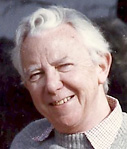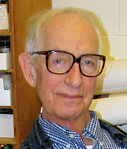Joseph Blotner
Joseph Leo Blotner, a former U-M professor whose biography of William Faulkner set a new standard for a literary biography, died Nov. 16 in Oakland, Calif.
As the editor of the Faulkner letters and then of all Faulkner’s novels for the Library of America, Blotner was the crucial expert of his era on one of America’s greatest novelists. His biography of Robert Penn Warren, moreover, was widely lauded and led to the establishment of the Joseph Blotner archives at the Penn Warren Library of Western Kentucky University.

Blotner
Blotner also was the author of a memoir, “An Unexpected Life,” in which he describes his atypical path to becoming one of the leading scholars of Southern literature. Born in 1923 in Scotch Plains, N.J., he halted his undergraduate career at nearby Drew University in order to serve in the Air Force. He was a bombardier aboard a B-17 Flying Fortress, and on his sixth bombing mission over Frankfurt, Germany, his plane was shot down. Blotner was held in a German prisoner-of-war camp for six-and-a-half months until Gen. George S. Patton’s Third Army liberated the camp on April 29, 1945.
Following his discharge, he returned to Drew, then achieved a master’s at Northwestern University and a doctorate at the University of Pennsylvania. Blotner taught at the University of Idaho, the University of Virginia, the University of North Carolina and U-M.
Blotner’s own last days were characteristically gentle. After the illness and death of his first wife Yvonne in 1990, Blotner enjoyed a sustaining marriage with Marnie Allen. When she died in 2006, he moved to California to be near a daughter and son-in-law. Explaining his surprising interest in the South given his Northern birthplace, Blotner characterized himself as “a resident of Yoknapatawpha County in the heart.”
A dedicated husband and father, Blotner also was a friend to great authors and nervous students alike. He served academia brilliantly and his nation bravely. His surviving family members and friends and colleagues could say of him as he said of Faulkner in the biography’s preface, “I will not see his like again.”
Blotner is survived by his daughters, Tracy Blotner Willoughby of Dexter and Pamela Blotner of Berkeley, Calif., and his granddaughter, Marnie Alicia Allen, of Charlottesville, Va. Nancy Blotner, his third daughter, died in 2004.
— Submitted by Jane Johnson, English Language & Literature
Theodore “Ted” Cohn
Theodore J. “Ted” Cohn died Nov. 25 after a prolonged illness at age 82.
Cohn was an orthopteran (crickets and katydids) specialist and a long-term adjunct curator of insects in the U-M Museum of Zoology. Cohn received his Ph.D. at U-M in 1961 and served on the faculty of San Diego State University from 1964-93, retiring as professor emeritus of biology. He was very active in The Orthopterists’ Society — an international scientific organization with 440 members from 60 countries — having served in many capacities, including president. Throughout his academic career, Cohn contributed to the UMMZ, adding many thousands of Orthoptera to the collection.

Cohn. Photo by Janet Bell.
Upon retirement, Cohn and his wife Jean, another UMMZ doctoral graduate, split their time between Ann Arbor (May-December) and San Diego (rest of the year) until ill health in recent years forced them to locate permanently in Ann Arbor. Despite severe sight impairment, rapidly declining health and the loss of Jean in December 2011, Cohn still came into work almost every day. He was determined to complete a large collaborative study entitled: “Dichopetala and new related North American genera: a study in genitalic similarity in sympatry and genitalic differences in allopatry (Tettigoniidae: Phaneropterinae: Odonturini).” He successfully achieved this goal and the manuscript is currently being prepared for publication.
For many years, Cohn donated generously to the UMMZ Insect Division, sponsoring the hiring of graduate and undergraduate student assistants for collection development, purchasing supplies and equipment for the collection, supporting visiting specialists, hiring artists to draw specimens in the museum collections for eventual publication, publishing papers based on museum holdings, and more. He was also a very generous donor for museum social functions and was an integral and valued part of the museum community. A gregarious, engaging personality and opera buff, Cohn rarely was at a loss for words and always quick to share a joke or an anecdote, according to his colleagues.
“Theodore J. Cohn was that rare entity, a genuine mensch,” said Diarmaid Ó Foighil, director and curator, UMMZ and professor of ecology and evolutionary biology. “He will be sorely missed.”
— Submitted by Diarmaid Ó Foighil, director and curator, U-M Museum of Zoology; associate chair for Museum Collections; and professor, Department of Ecology and Evolutionary Biology

